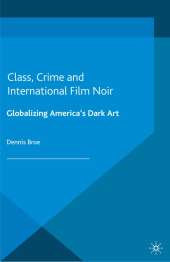 Neuerscheinungen 2014Stand: 2020-02-01 |
Schnellsuche
ISBN/Stichwort/Autor
|
Herderstraße 10
10625 Berlin
Tel.: 030 315 714 16
Fax 030 315 714 14
info@buchspektrum.de |

D. Broe
Class, Crime and International Film Noir
Globalizing America´s Dark Art
1st ed. 2014. 2014. xvii, 233 S. 216 mm
Verlag/Jahr: SPRINGER PALGRAVE MACMILLAN; PALGRAVE MACMILLAN UK 2014
ISBN: 1-349-45041-3 (1349450413)
Neue ISBN: 978-1-349-45041-1 (9781349450411)
Preis und Lieferzeit: Bitte klicken
Class, Crime and International Film Noir argues that, in its postwar, classical phase, this dark variant of the crime film was not just an American phenomenon. Rather, these seedy tales with their doomed heroes and heroines were popular all over the world including France, Britain, Italy and Japan.
List of Figures Foreword Preface: On Symbolic Misery and Its Attenuation (And the Crime Film) Acknowledgements Introduction: Global Fugitives: Outside the Law and the Cold War ´Consensus´ 1. Un greve, sanglant et poetic (A Strike, Bloody and Poetic): French Film Noir and the Defeat of the Popular Front 2. The Revolution That Wasn´t: Black Markets, Ressentiment, and Survival in Postwar British Film Noir 3. The Wintering of the Italian Spring: From Neorealism to Film Noir via Verdi 4. Occupy the Zaibatsu: Postwar Japanese Film Noir: From Democracy to the (Re)Appearance of the (Old) New Order Conclusion: Mediterranean Noir: Sunlight Gleaming Off a Battered .45 Appendix Bibliography Endnotes Index?
´Broe´s American Workers and Postwar Hollywood argued that American film noir expressed the plight of American workers between WW II and the Cold War, under the persecution of corporate capitalism. For Broe, the dark stylistics and plots of American film noir express the despair of defeated American workers in unionized struggles against corporate power. The present book extends that argument to France, Britain, Italy, and Japan. Broe argues that the postwar noir films produced in these countries are even more clearly a feature of the class struggle and American corporate power in these foreign economies. Le Quai des Brumes and Le Jour se Lève (French poetic realism), Bitter Rice (Italian neorealism), Night and the City (British social realism), and The Bad Sleep Well (Japanese noir) all critique international capitalism and its triumph over workers´ interests. The argument is coherent, and the research gathered to support this thesis is extensive. Broe´s argument is that film noir is a form of protest against socioeconomic conditions rooted in historical factors. For a different analysis of film noir, see Robert Pippin´s Fatalism in American Film Noir (2012), which argues that noir is surrounded by social conditions but rooted in the human condition.´ - R. Ducharme, Mount Saint Mary´s University
Dennis Broe is Professor of Media Arts at Long Island University, USA. His Film Noir, American Workers and Postwar Hollywood was a Choice Outstanding Academic Book. He has written widely on political economy, studio history, and the Western in Cinema Journal, Jump Cut, Film and History, Framework, Social Justice, Situations, and Newsday. He is also a film critic on Pacifica Radio.


